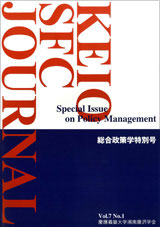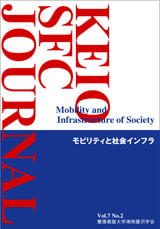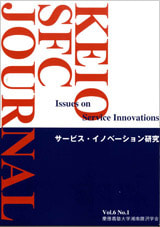- HOME
- KEIO SFC JOURNAL
- Vol.7 No.1

KEIO SFC JOURNAL Vol.7 No.1 Special Issue on Policy Management
published on 2007.12
-
Recognition Science - A Tentative Framework
Shumpei Kumon Director, The Institute for Social Knowledge and Collaborations: Kumon Center, Tama University In recent years, various endeavors to build "design sciences" as discipline-free, purposeful sciences with various themes have been observed. Development of such new sciences however has to be grounded in some form of "recognition science". Above all, establishment and application of a "general recognition science" that lies beyond the boundaries of individual recognition-scientific disciplines is indispensable for the success of design science. This paper identifies general recognition science with general systems theory and, having distinguished four major forms of general system: logical, physical, living, and social, attempts to present various forms of "logical system" as the most general systems, in a systematic way.
Download this article (PDF): SFCJ7-01.pdf -
Policy Management Studies and "Sustainable Welfare Society" − A perspective for policy integrations
Yoshinori Hiroi Professor, Faculty of Law and Economics, Chiba University There is a growing need for public policy studies aimed at integrating different policy areas. This article explores the possibilities for such policy integration utilizing the basic concept of a "sustainable welfare society" and paying particular attention to the integration of welfare, environment and economy. First, a conceptual framework is presented for policy integration. This is followed by a reevaluation of postwar Japanese public policy from the perspective of redistribution policy and policy integration, and lastly, a comprehensive structure from local to global level is discussed.
Download this article (PDF): SFCJ7-02.pdf
-
Everyday Life and Needs after Retirement − A case study of Takesumi Club in Fujisawa c
Daisuke Watanabe COE Research Assistant, Doctoral Program, Graduate School of Media and Governance, Keio University This paper examines how Japanese elderly people identify and fulfill their daily needs after retirement by sustaining group activities. This was achieved by observing one particular case: the Takesumi Club (a bamboo charcoal-making group) in Fujisawa City. In today's Japan, many elderly people are able to receive public support. However, some of their needs may lie beyond the scope of this support. I began my research by according what have hitherto been considered "private" needs their rightful status. A participant observation and in-depth interview method is used to probe the case, and reveal the emergence of mutually reinforcing care relationships evolving around the creation and maintenance of a common "place" in order to fulfill the needs of participants.
-
The Effect on Staff in a Long-Term Care Hospital of Performance Interviews with their Supervisor − An attempt to increase perceived social support and control
Emiko Ban COE Research Assistant, Doctoral Program, Graduate School of Media and Governance, Keio University The aim of this study was to examine the effects of working staff performance interviews on their perceived degrees of social support, control, stress responses, and burnout. One supervisor and fourteen staff of a long-term care hospital participated in the intervention program. The supervisor participated in a 5-hour 25-minute coaching program. The staff underwent a 30 to 45-minute interview with the supervisor that included a performance review, goal setting and discussion of interests and concerns. Both the supervisor and staff participated in a 40-minute brainstorming session to discuss their various concerns. The effects of the intervention were examined through pre- and post-test comparisons, and evaluations of the performance interviews and one group interview.
-
Building a Mechanism for Community Care in Metropolitan Suburbs − Through the analysis into the actual conditions of community services by community care center in Yokohama city
Daiichiro Ishii COE Research Assistant, Doctoral Program, Graduate School of Media and Governance, Keio University Takiko Fujii Assistant Professor, Graduate School of Media and Governance, Keio University In metropolitan suburbs, it is necessary to restructure local communities to help the elderly live better, more fulfilling lives. Another requirement is the formation of a community care mechanism based on face-to-face relationships capable of connecting physical and mental changes in the elderly to adequate services. This study uses a questionnaire survey and residential structure analysis to focus on community services implemented by the Community Care Center in Yokohama and clarify the structural difficulties of implementation in terms of the diversity of residential structures. Based on the results of this study and interviews, we suggest building a community care mechanism based on mutual learning and participation of the individuals concerned.
-
"European Federation" to Come − Its historical situation and present
Yohei Nakashima Doctoral Program, Graduate School of Media and Governance, Keio University Concerning the future form of European Construction, France has traditionally supported a confederation while Germany has sought a federation. However, the EU has adopted its constitutional treaty and resolved the question by declaring that the form would be a "Federation of Nation States". The contours of this form of federation, where Europe stands alongside nation states, have in fact already been revealed with the introduction of the status of European citizen when regulations for European citizenship were included in the Maastricht Treaty. Europe is a legal and political territory where citizens having legal and political status exercise their citizenship, whereas nation states are cultural territories. This type of Europe is created when the French idea of "nation" is rigidly applied.
Download this article (PDF): SFCJ7-06.pdf -
Understanding the Transformation of Post-Cold War Japanese Peace Operations − A view combining security and development
Sachi Nagaoka Visiting Fellow, Department of Government, Harvard University Japanese peace operations in the post-Cold War period have been evolving as the government responds to cases such as the Gulf Crisis, Cambodia, East Timor, Afghanistan and Iraq. Understanding the transformation of Japanese peace operations requires introducing a "policy management approach," which focuses on the process of implementing policy decisions, as well as analyzing interactions among various actors in the process. Applying this approach, I will propose a new analytical framework founded on a view combining security and development.
-
The Disclosure of Information and its Effects on Organizational Relationships − A focus on practices and evaluations in Food Processing companies
Mikako Ogawa Assistant Professor, Graduate School of Marine Science and Technology, Tokyo University of Marine Science and Technology Masaki Umejima Assistant Professor, Graduate School of Media and Governance, Keio University Jiro Kokuryo Professor, Faculty of Policy Management, Keio University Our research on food traceability systems indicates that many organizations are skeptical about the positive effects of disclosing information. However for manufacturers that readily disclose information, this disclosure was conducive to the exchange of production know-how with raw material suppliers. Disclosure may also promote the flow of information between suppliers and manufacturers. As a result of our research, we are able to devise a conceptual model which encourages this disclosure of information between manufacturers and suppliers.
Download this article (PDF): SFCJ7-08.pdf
-
Download this article (PDF): SFCJ7-09.pdf
Defining Policy Innovation − Edited by Moriyuki Oe, Mitsuaki Okabe, Michio Umegaki, Keio University Press, 2006
Michio Fujiwara Dean, Professor, Faculty of Policy Studies, Nanzan University -
Download this article (PDF): SFCJ7-10.pdf
Emergence in the Networked Society − Edited by Jiro Kokuryo, Nikkei BP Planning (Nov. 2006)
Ken Senoh Visiting Professor, Center for Collaborative Research, The University of Tokyo President and Chairperson, The Industry-Academia Collaboration Initiative (Non Profit Organization)

